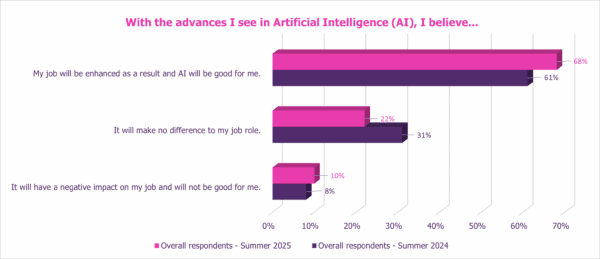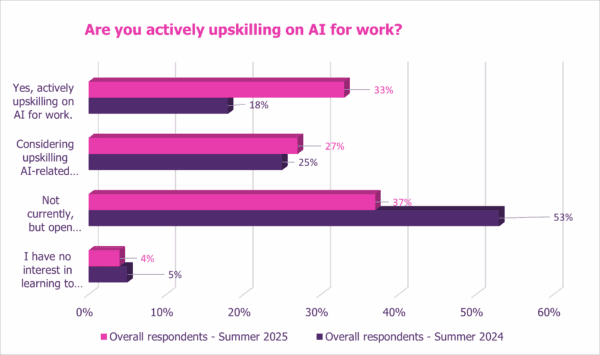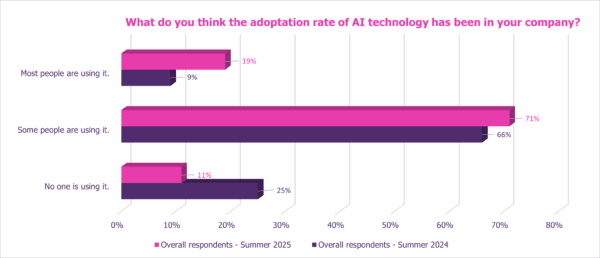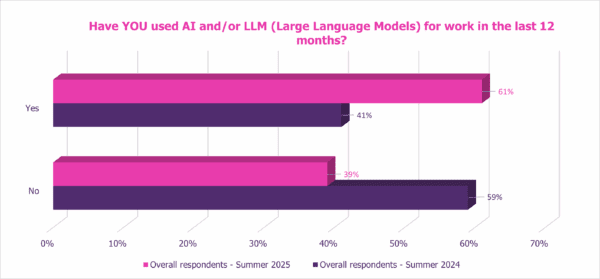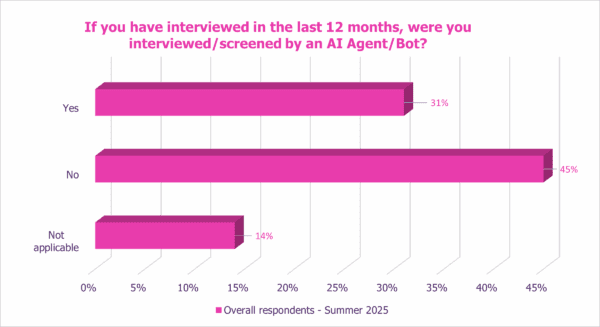Candidate sentiment survey: Part two – AI in the workplace
Paul McArdle | Talent & Recruitment Columnist | The Currency
The Panel runs a candidate sentiment survey for The Currency twice yearly to assess candidates’ attitudes to specific topics.
The candidates surveyed were from junior management to the C-suite level in the IT, finance, accounting, legal, HR, banking, and ESG professions. Some 1,634 candidates completed the survey.
The candidates were presented with a multiple-choice answer for every question.
We compare the answers in the summer 2025 survey to the last survey in which we asked the same question.
The survey had a free-text box at the end, and close to 10 per cent of the candidates chose to give us their observations on certain topics. The AI questions prompted an unprecedented level of engagement; We have included more comments than we usually would to reflect the candidate sentiments accurately.
In part one of the findings, we look at the issue of working from home, future expectations and the balance of power in the workplace.
Today, we examine the impact of AI in the workforce.
As more people embrace AI, it is really interesting that candidates believe AI is good for their jobs. The 68 per cent figure is up 10 per cent from last year (61 per cent in 2024), and over 30 per cent from our original survey (49 per cet in Summer 2023).
Where one in three respondents didn’t think AI would make a difference to their role last year, that number is now down to one in five. We are surprised at the 10 per cent figure regarding AI having a negative impact on someone’s job, we expected that to be higher.
What the respondents said:
“I work in IT, so I don’t take notice of the AI hype nonsense, it’s embarrassing.“
“AI is a sad reality because it will take time to transition to it and use it effectively. Meantime in the current job market, it’s causing more damage than good in my opinion.“
“AI will lead to over-reliance on technology without a specific understanding of how it works. The value of eyes on the detail will be undervalued and will lead to issues for those who adopt it without fully understanding it and without sufficient oversight.“
“The rate of obtaining data from AI is too high and looks better than it actually is. The governance boundaries are not clear, and AI should be taken with a pinch of salt. In my opinion, Artificial Intelligence represents a shift in the way we work. I don’t believe it will eliminate jobs, but it will make a significant difference: those who don’t adapt or develop new skills risk being left behind.“
“AI, LLMs and agentic AI is my focus of doctorate studies and the reason I am now employed as a TA at my university as well as the core part of my day job as AI Leader at a Fintech.“
“AI is clearly a massive theme running through everything at the moment, but the vast majority of people don’t know what it is or what it can do. The product of AI can only ever be as good as the configuration and the inputs, I feel in a lot of cases, people may be getting overexcited, but there is a real risk of getting the cart before the horse.“
“AI is the tool, will never replace humankind, and we should be careful with the idea of learning AI to be like us.“
“I work in academia, and while AI is useful for lecturers and students alike, it is presenting significant challenges with regard to authenticity and assessment.“
“AI is just fast search. It doesn’t replace critical thinking or intelligence. If Google can outwit you about your core job function then you are bad at your job, not threatened by AI. It searches the internet for an answer, collates the most popular ones and presents them. Simple questioning will often get it to flip-flop its outcomes based on the additional input; the “I” is missing. Where it can be used to streamline tasks it isn’t AI, it is just an ordering program that any competent IT professional could do better. It is a software solution. People bleat on about AI like it’s this thinking machine and use weird internet examples to justify their lack of understanding. It’s 95 per cent hype and five per cent deliverability. Go to any AI and ask it for an opinion on a topic, and it will fail once you debate. So overall, no, AI poses no threat at all to an intelligent person who knows their job and it can be proved as the incompetent sidekick within minutes in almost any scenario… except being faster at search.“
A big difference in a year, with twice as many people using AI consistently (nine per cent to 19 per cent). Only one in ten respondents is not using AI; it was one in four last year. So, adoption levels are increasing significantly, but still, 70 per cent of respondents are using it sparingly.
We are expecting the AI adoption figures to rise significantly with more people using it for work. Already we are seeing US corporate giants pushing the use of AI.
What the respondents said:
“Lawyers don’t understand enough about AI technology to use it correctly- to apply it to problems which it can actually solve.“
“AI gets a lot of airtime proportionate to usage in the workplace for most managers.”
“Not sure I like the advancement of AI in the workplace. It’s a dangerous trend.“
“Smart businesses are moving to AI automation. If you’re not on top of that in your job and able to do it, you will be left behind.“
“AI is disruptive, requiring businesses to rethink their strategy and USP – AI will predominate in the next three to five years, and organisations failing to adapt will cease to exist.“
“AI in the legal sphere is more hype than reality at present. An AI personal assistant trained on my data and my way of working would make a dramatic difference. LLMs try to be all things to all people.“
This result surprised us; we had expected the use of Chat GPT, Copilot, Gemini, etc., to be much higher. That said, there is a 50 per cent increase from our last survey of respondents using LLMs (41 per cent to 61 per cent today).
What the respondents said:
“My observation is that most of the interest in AI is happening at an individual level rather than formally at a corporate level. Organisations have not decided policy on AI nor appropriately resourced. AI is Wild West, for the moment.“
“Very clear that applications, particularly at a junior level, are produced by LLMs. This is across CVs, cover letters and case studies. More often than not, in assessing candidates, this is a quick way to screen them out.“
The number of respondents upskilling on AI has almost doubled in the last 12 months (18 per cent to 33 per cent today). One in twenty-five respondents has no interest in upskilling in AI, which is a low figure, all things considered. Sixty per cent of the respondents are either upskilling on AI or considering doing so, up from 45 per cent last year.
What the respondents said:
“Using chatbots has advanced me ahead of colleagues who are easily the same level as me.“
“I work in a tech company so upskilling for all employees is being managed across the company. Though in the market I feel there are those who know about AI and those who don’t, they don’t realise how quickly they will get left behind. It’s all happening very silently.“
“The adoption of AI is in its infancy. It is good for some things and really terrible for others. The danger is when senior people who don’t understand it and its capabilities want to adopt it based on the hype and “being seen to be using AI”.“
“Most people don’t fully understand AI but want it implemented. Don’t want to put the effort in to achieve AI goals because it’s difficult at the lowest level of people, process, technology, data. The likes of copilot can help complement and speed up mundane tasks. AI gets you budget so people are rebranding traditional automation as AI to get the budget!“
“Education for the professional staff is required across the company – people are worried about stepping into the unknown.“
A new question in this survey. AI agents and bots are gaining popularity, particularly among companies that conduct high volumes of recruitment. The 31 per cent figure of candidates with experience with AI screening is a number we find surprisingly high, and a sign that more candidates are willing to interact with AI agents.
What the respondents said:
“It gets rid of good talent based on the skimming of CVs.“
“The way candidate screening with AI is happening will be a large lawsuit waiting to happen to recruitment companies. Prepare for questions on your bias engines.“
“I believe companies have become too dependent on AI bots for screening applications… I appreciate that the same technology is being used to generate non-relevant applications. Don’t have an answer – but something has to give!“
“I do not think I was screened by an AI bot – but maybe I was!“
“AI and bots at the moment are not properly optimised to human interaction and we see more and more fake interactions that don’t bring true results.“
“Many of the jobs I have applied for have proven to be fake, nothing more than an employer’s exercise to either gather data or provide a false sense of growth.“
“Yes, some big 4s are using human recruiters to scout, but the online portal is rejecting all candidates. Lots of jobs pulled from the market recently & other firms are putting up job ads to show activity Vs actually hiring. Was out of work for three months despite lots of job fits, but few moving forward, so accepting job with 30% salary reduction to secure any role.“
“AI incorrectly screened my application out of consideration more than once and I had to contact the hiring manager directly on LinkedIn. There’s a major issue with AI screening job applications that doesn’t seem to be talked about.“
“I would have no interest in being interviewed by an AI bot. Happy to use them as an intro for surveys or customer support, but that’s the limit.“
“Using AI to select candidates is legally dubious and is a high-risk activity in terms of the new EU AI Act. Automatic decision-making is forbidden by EU law in the context of employment.“
“One of the biggest issues I’ve seen is how heavily recruitment has been outsourced to automated systems and external recruiters. I’ve submitted over 250 applications, tailored my CV for different roles, and received only four interview invitations. Most of the time, there is no response at all. It’s incredibly frustrating to see recruitment processes that rely almost entirely on tools and algorithms instead of giving people a fair chance to present themselves. With 21 years of experience in operations and administration, 10 years in finance, and six years as a board member, I find myself stuck – considered underqualified for director roles, overqualified for lower-level ones, and simply ignored for managerial positions. Something is broken in the system when qualified professionals can’t even get to the conversation stage.“
“I’m optimistic having just started a job, but the prior six months of searching were horribly demoralising. The ATS and bot-driven hiring process is horribly broken. There is an opportunity for recruiters to step in and fix a lot of this as the common contact between employers and job seekers.“
“AI bots are poor at screening candidates who have diverse or unconventional CVs.“
“I think using a bot for interviews has serious risks for certain industries particularly where relationships are key to its success. I have found it increasingly frustrating to obtain relevant opportunities as more search engines use algorithms to reduce the pool of potential candidates, and the question is whether the algorithm is sufficiently mature to highlight the right candidates in any short list.“
“AI is evolving all the time and candidates are embracing it more, some voluntarily and some because they have no choice. It is changing the way we work, and respondents are cognisant of these changes and learning how to use it. AI is here to stay, it will be fascinating to watch where it brings us next.”

